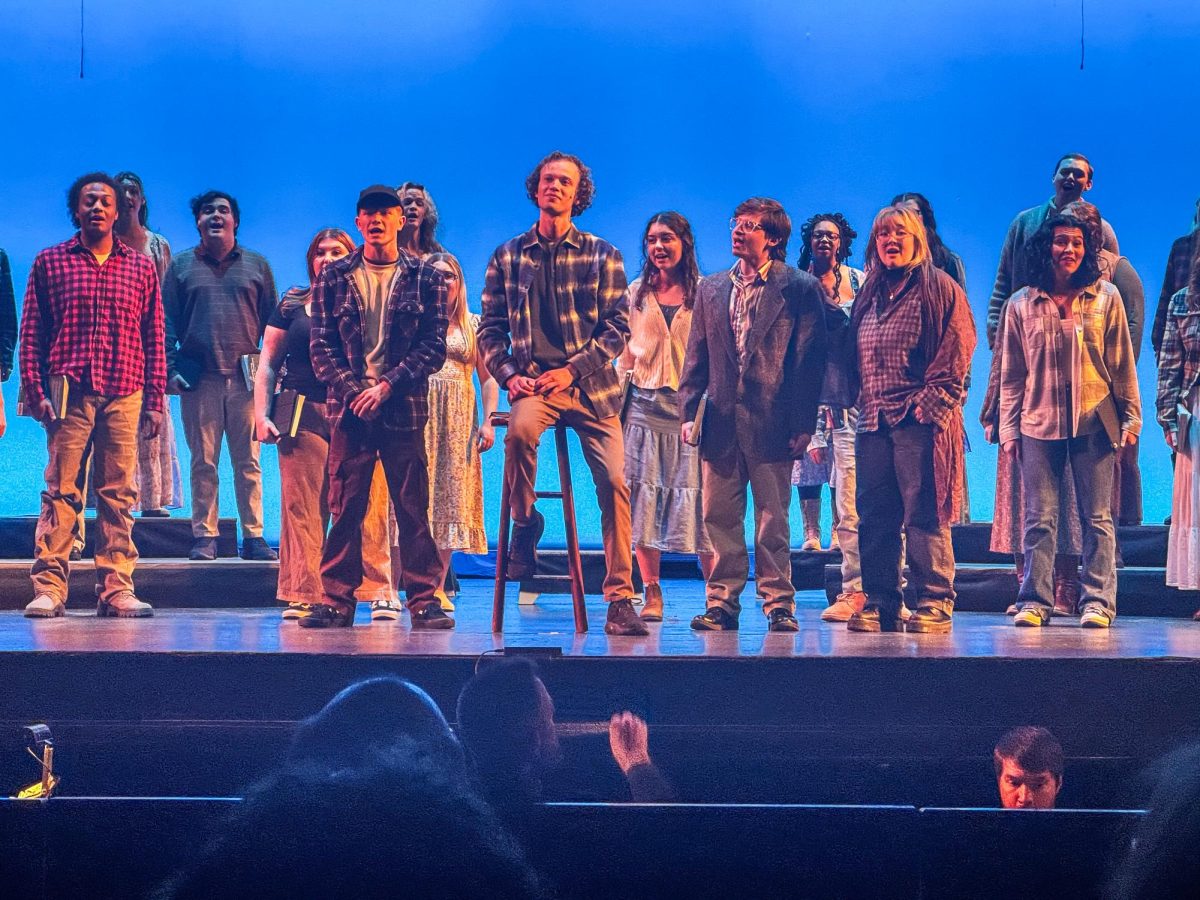On Dec. 7, 2024, the Rowan University Concert Choir presented their fall semester concert, “Considering Matthew Shepard,” composed by Craig Hella Johnson about 21-year-old gay man Matthew Sheppard, and the national conversation about homophobia that followed.
For those who might be unaware of the story, Matthew Shepard was a 21-year-old gay college student who was brutally beaten, tied to a fence, and left to die near Laramie, Wyoming, in October of 1998. His attackers targeted him because of his sexual orientation, sparking nationwide outrage.
Shepard’s death became a catalyst for the LGBTQ+ rights movement and led to the eventual passage of hate crime legislation, including the 2009 Matthew Shepard and James Byrd Jr. Hate Crimes Prevention Act.
Assistant Teaching Professor Dr. Whitney Cox, in the program notes, who was in high school when Shepard passed, felt confused and still is trying to put it all together 26 years later.
“I met the story of Matthew Shepard the week he died when I was a senior in high school. Ever since, I’ve been left puzzling out what his story means to me. I suppose most of us now-aging queers who remember his death have. I suppose we always will,” said Cox.
As seats filled up at Pfleeger Concert Hall, the lights dimmed, and conductor Christopher Thomas kicked off the show with a short speech.
“Craig Hella Johnson’s oratorio goes beyond the tragedy to explore our shared humanity,” said Thomas.
As the choir stepped onto the stage, the audience was transported back to rural Wyoming in 1998. Guys wore plaid and dark blue jeans, and girls wore prairie dresses.
The concert opened up with “Cattle, Horses, Sky and Grass.” The song itself is a poetic celebration of life, nature, and humanity’s connection to the natural world. It reflects on the beauty and harmony of the environment cattle, horses, sky, and grass—as eternal and vital forces that continue to “dance and never die.”
The song was followed by “Ordinary Boy,” which introduces the audience to Matthew Shepard. The song reflects on Matthew as a regular, relatable person, a normal 21-year-old with hopes, dreams, and vulnerabilities, much like anyone else. Senior bass II Justin Kurbansade resonated with the meaning of the song.
“I have always had a soft spot for Ordinary Boy. It is just such a beautiful way to humanize Matt Shepard and understand that he was just like any of us. Everything about it is so beautiful, and it never gets old to sing,” said Kurbansade.
The arrangements that followed told the story of Matthew Shepard and the fence that he died on. The fence, like the evergreen, becomes a symbol of resilience, love, and remembrance. It embodies both the sorrow of Matthew’s death and the enduring call to honor his legacy through compassion and justice.
In the arrangement “Fence (That Night)” sung by Kurbansade, Repeated phrases—“I held him all night long” and “I tightened my grip and held on,” evoked the image of the fence as a silent caretaker. The fence, though inanimate, cradled Matthew in his final hours, much like a mother holding a child.
A shocking moment in the show for a lot of the audience was during the arrangement “A Protestor.” Which depicted the actual protestors that stood outside Matthew Shepard’s trial and funeral. The Choir held up signs that read “Repent or burn” and “Matt in hell,” amongst other more triggering signs. Freshman Hannah Slimak felt transported to a different time when she saw the scene.
“It genuinely felt like I was back in the 90’s, and really put things into perspective,” said Slimak.
When it comes to performing something so heavy, and so real, there are a lot of emotions that come along with it. That statement remained very true for Senior Bass II John Hoey.
“What emotions didn’t I feel while performing this concert? As storytellers, you have to be open. Then you go and you’re an angry mob, protesting this kid, and then you turn around, and you’re praising him and lifting him up and trying to spread the goodness,” said Hoey.
Meanwhile, junior alto I Emilee Townsley felt like it was imperative to tell this story, and at a top-notch level.
“I definitely felt a sense of urgency to want to tell this story, but also a bit of anxiety because it is a very serious and very big story to tell and I wanted us to be able to tell it and the best of our ability,” said Townsley.
Matthew Shepard’s story is extremely thought-provoking and very personal, for many, it hit home. Especially for junior tenor I, Mark Green, who shared a very personal story about how The Protestor scene and Matthew Shepard’s story as a whole directly affected his life.
“I’m gay myself, and being in a family where most of them are Christian, that’s most of the stuff I’ve been hearing all my life, and then seeing my mom here, and she told me that she accepts me because of what she saw. So this story represents who I am as well,” said Green.
Matthew Shepard’s story has left an everlasting mark on Rowan University’s Concert Choir and the university as a whole. The concert reflected themes of humanity, loss, and remembrance, leaving a lasting impact on the audience.
For comments/questions about this story DM us on Instagram @thewhitatrowan or email [email protected]























































































































































!["Working with [Dr. Lynch] is always a learning experience for me. She is a treasure,” said Thomas. - Staff Writer / Kacie Scibilia](https://thewhitonline.com/wp-content/uploads/2025/04/choir-1-1200x694.jpg)









































